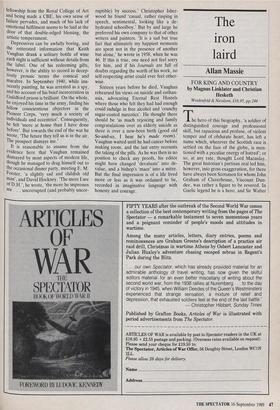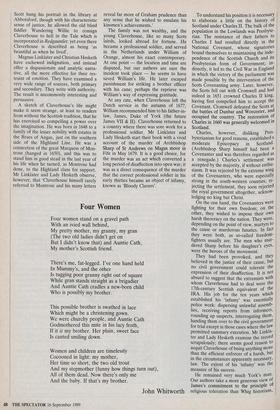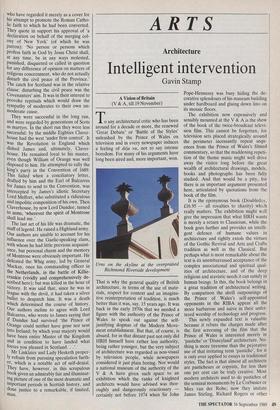The iron laird
Allan Massie
FOR KING AND COUNTRY by Magnus Linklater and Christian Hesketh Weidenfeid & Nicolson, £16.95, pp.244 he hero of this biography, 'a soldier of distinguished courage and professional skill, but rapacious and profane, of violent temper and of obdurate heart, has left a name which, wherever the Scottish race is settled on the face of the globe, is men- tioned with a peculiar energy of hatred'; or so, at any rate, thought Lord Macaulay. The great historian's partisan zeal led him, however, into gross exaggeration, for there have always been Scotsmen for whom John Graham of Claverhouse, Viscount Dun- dee, was rather a figure to be revered. In Gaelic legend he is a hero, and Sir Walter Scott hung his portrait in the library at Abbotsford, though with his characteristic sense of justice, he allowed the old blind fiddler Wandering Willie to consign Claverhouse to hell in the Tale which is incorporated in Redgauntlet: yet even there Claverhouse is described as being 'as beautiful as when he lived'.
Magnus Linklater and Christian Hesketh have eschewed indignation, and instead offer a dispassionate and analytic narra- tive, all the more effective for their res- traint of emotion. They have examined a very wide range of sources, both primary and secondary. They write with authority. The result is uncommonly interesting and persuasive.
A sketch of Claverhouse's life might make it seem strange, at least to readers from without the Scottish tradition, that he has exercised so compelling a power over the imagination. He was born in 1648 to a family of the lesser nobility with estates in the Braes of Angus, just on the southern side of the Highland Line. He was a connection of the great Marquess of Mon- trose (hanged in 1650), and this was to stand him in good stead in the last year of his life when he turned, as Montrose had done, to the Highland clans for support. Mr Linklater and Lady Hesketh observe, however, that 'Claverhouse himself rarely referred to Montrose and his many letters reveal far more of Graham prudence than any sense that he wished to emulate his kinsmen's achievements.'
The family was not wealthy, and the young Claverhouse, like so many Scots lairds, looked abroad for fortune. He became a professional soldier, and served in the Netherlands under William of Orange, almost his exact contemporary. At one point — the location and time are disputed, but our authors are sure the incident took place — he seems to have saved William's life. He later escaped punishment for striking a brother officer with his cane; perhaps the reprieve was William's way of expressing gratitude.
At any rate, when Claverhouse left the Dutch service in the autumn of 1677, William recommended him to his father-in- law, James, Duke of York (the future James VII & II). Claverhouse returned to a country where there was sore work for a professional soldier. Mr Linklater and Lady Hesketh start their book with a vivid account of the murder of Archbishop Sharp of St Andrews on Magus moor in Fife in May 1679. It is a good choice, for the murder was an act which converted a long period of disaffection into open war; it was as a direct consequence of the murder that the correct professional soldier in his early thirties became an object of infamy, known as 'Bloody Clavers'. To understand his position it is necessary to elaborate a little on the history of Scotland under Charles II. The bulk of the population in the Lowlands was Presbyte- rian. The resistance of their fathers to Charles I had resulted directly in the National Covenant, whose signatories bound themselves to maintaining the inde- pendence of the Scottish Church and its Presbyterian form of Government; in- directly, it led to the Civil War in England in which the victory of the parliament was made possible by the intervention of the Scots Covenanting army. Later, however, the Scots fell out with Cromwell and had indeed in 1651 crowned Charles II king, having first compelled him to accept the Covenant. Cromwell defeated the Scots at the battles of Dunbar and Worcester, and occupied the country. The restoration of Charles in 1660 was generally welcomed in Scotland.
Charles, however, disliking Pres- byterianism for good reasons, established a moderate Episcopacy in Scotland. (Archbishop Sharp himself had been a Covenanter and was therefore regarded as a renegade.) Charles's settlement was accepted by the majority, if without enthu- siasm. It was rejected by the extreme wing of the Covenanters, who were especially strong in the south-western counties; re- jecting the settlement, they soon rejected the royal government altogether, acknow- ledging no king but Christ. On the one hand, the Covenanters were fighting for their own freedom; on the other, they wished to impose their own harsh theocracy on the nation. They were, depending on the point of view, martyrs to the cause or murderous fanatics. In fact they were both, as so-called freedom fighters usually are. The men who mur- dered Sharp before his daughter's eyes, were the heroes of the movement.
They had been provoked, and they believed in the justice of their cause, but no civil government could tolerate the expression of their .disaffection. It is not absurd to suggest that the extremists with whom Claverhouse had to deal were the 17th-century Scottish equivalent of the IRA. His job for the ten years which established his 'infamy' was essentially police work: dispersing unlawful assemb- lies, receiving reports from informers, rounding up suspects, interrogating them, handing them over to the civil government for trial except in those cases where the law permitted summary execution. Mr Linkla- ter and Lady Hesketh examine the record scrupulously; there seems good reason to acquit Claverhouse of being anything more than the efficient enforcer of a harsh, but in the circumstances apparently necessary, law. The extent of his 'infamy' was the measure of his success.
He remained very much York's man. Our authors take a more generous view of James's commitment to the principle of religious toleration than Whig historians, who have regarded it merely as a cover for his attempt to promote the Roman Catho- lic faith to which he had been converted. They quote in support his approval of 'a declaration on behalf of the merging col- ony of New York' (of which he was Patron): No person or persons which profess faith in God by Jesus Christ shall, at any time, be in any ways molested, Punished, disquieted or called in question for any difference of opinion on matters of religious concernment, who do not actually disturb the civil peace of the Province.' The catch for Scotland was in the relative clause: disturbing the civil peace was the Covenanters' aim. It was in their interest to Provoke reprisals which would draw the Sympathy of moderates to their own im- moderate cause.
They were successful in the long run, and were regarded by generations of Scots as martyrs. In the short run they were less successful: by the middle Eighties Claver- house had the west 'under firm control'. It was the Revolution in England which dished James and, ultimately, Claver- house. He remained loyal to his master, even though William of Orange was well disposed to him. He attempted to rally the king's party in the Convention of 1689. This failed when a conciliatory letter, drafted by him and the Earl of Balcarres for James to send to the Convention, was intercepted by James's idiotic Secretary Lord Melfort, who substituted a ridiculous and impolitic composition of his own. Then Claverhouse, by now Lord Dundee, turned to arms, 'wherever the spirit of Montrose shall lead me.'
The last act of his life was dramatic, the stuff of legend. He raised a Highland army. Our authors are unable to account for his Influence over the Gaelic-speaking clans, With whom he had little previous acquaint- ance, but personal charm and the memory of Montrose were obviously important. He defeated the Whig army, led by General Mackay, once his commanding officer in the Netherlands, in the battle of Killie- crankie (vividly and comprehensively de- scribed here); but was killed in the hour of victory. It was said that, since he was in league with the devil, it had taken a silver bullet to despatch him. It was a death Which determined the course of history. Our authors incline to agree with Lord B. alcarres, who wrote to James saying that if Dundee had survived 'the Prince of Orange could neither have gone nor sent into Ireland; by which your majesty would have been entire Master of the Kingdom and in condition to have landed what forces you pleased in Scotland. . Mr Linklater and Lady Hesketh proper- ly refrain from pursuing speculation furth- er, which is a notable act of self-denial. They have, however, in this scrupulous book given an admirably fair and illuminat- ing picture of one of the most dramatic and Important periods in Scottish history, and done justice to a remarkable, if limited, man.




































































 Previous page
Previous page